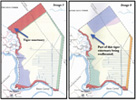A protest in which 28 Indonesian sewed their mouths shut has led to an inquiry into a logging concession on Padang Island. The Ministry of Forestry has formed a mediation team to look into the controversial concession, reports Kompas. Around a hundred natives of Padang Island rallied for weeks against the logging concession held by PT Riau Andalan Pulp and Paper (RAPP), which covers 37 percent of the island’s total land.
The team will be selected from Indonesia’s Presidium of the National Forestry Council (DKN) including a mix of government officials, scientists, NGO, and business people. The inquiry will not have decision-making powers, but will report their recommendation to the Ministry.
The protesting islanders argue that the 2009 concession occurs on customary lands, threatening both the environment and the small-scale agriculture on which they depend. They demand that the Indonesian government revoke the logging concession, which is largely located on peatland rainforests, from RAPP.
For its part, RAPP says they have seen no proof that the concession is on customary land, but they will abandon the concession if proof comes forward. The logging company says it secured approval from 14 village chiefs, though three have since bolted from the agreement.
“We’re not even sure if the protesters are actually from Pulau Padang or not,” RAPP president commissioner, Tony Wenas, said as reported by the Jakarta Post. “For all we know, there are ex-cons among the protesters.”
An Indonesian NGO, Greenomics, has released a report alleging that RAPP’s parent company, Asian Pacific Resources International Holdings Limited (APRIL), has wrongly claimed it has set aside 4,102 hectares of the Padang Island concession (around 10 percent of the total) for conservation. Greenomics argues that the touted “protected areas” were not such at all, since Indonesian law required the land to be set aside.
“None of the land set aside for conservation […] was set aside at the company’s own initiative. Rather, all the land was required to be set aside under Indonesian law,” the report reads. The report further argues that one of the main reasons behind the concession is a corporate need for raw materials taken from clearing the standing forest, garnering between 1.43 and 2.15 million square meters of materials for APRIL’s paper mills.
Earlier this year, RAPP was accused of clearing high conservation value forest in Riau province on Sumatra. The forest was a known wildlife corridor for the Sumatran tiger (Panthera tigris sumatrae), listed as Critically Endangered by the IUCN Red List, among many other species.
APRIL did not respond to requests for comment.
- Editor’s note: APRIL replied to mongabay on January 16 and noted that it issued a statement in response to Greenomics. Greenomics subsequently issued a response to APRIL’s statement.
Related articles
Mouths are sewn shut in protest against deforestation in Indonesia
(01/03/2012) Twenty-eight Indonesians have taken the extreme measure of sewing their mouths shut in a protest turned hunger-strike against a forest concession on Padang Island, reports the Jakarta Globe. Around a hundred protesters, mostly natives of Padang Island, have camped outside the Indonesian Senate building since December 19th to protest a logging concession held by PT Riau Andalan Pulp and Paper (RAPP) on their island, which lies off the east coast of Sumatra.
Kroger, America’s largest grocery chain, stops carrying APP products due to deforestation concerns
(12/22/2011) Kroger, America’s largest grocery store chain, will stop carrying products sourced by Asia Pulp & Paper (APP) due to concerns about deforestation, according to a statement on the company’s web site. The move comes after a Greenpeace campaign targeting Paseo, a fast-growing toilet paper brand owned by APP.
New analysis supports claim that paper giant cleared part of its tiger sanctuary in Indonesia

(12/21/2011) Asia Pulp & Paper (APP)’s supplier PT Ruas Utama Jaya has indeed cleared an area of forest it pledged to set aside as a tiger conservation reserve in Sumatra reports a legal analysis by Greenomics, an Indonesian environmental group. The Greenomics’ analysis supports allegations originally set forth in a report published last week by Eyes of the Forest, a coalition of green groups, and seems to refute a press release issued by APP that called the deforestation allegations ‘fiction’.







